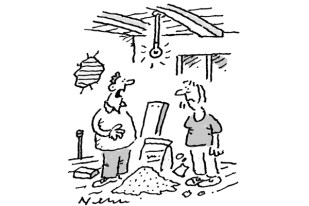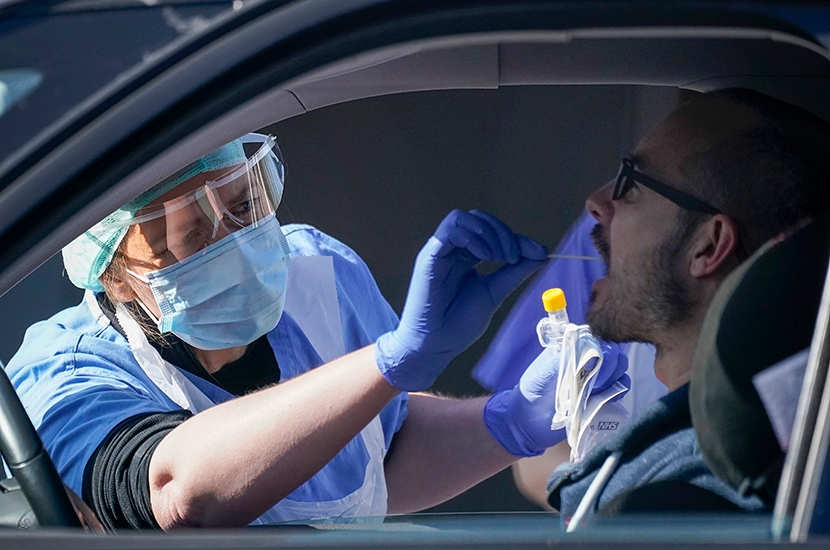My friend ‘D’ is an instantly recognisable type in the Middle East: the middleman. He’s always chasing the next deal, always about to make millions. One scheme was to build a London Eye in a flyblown town in the Levant. Another was to buy a ‘Trump sex tape’ for $10 million. He invited me to watch the negotiations. They ended with a sociopathic Russian gangster ringing up in the night threatening to kill my children. ‘We know where you live.’ His latest scheme is to get the British government to buy coronavirus test kits from Turkey. This could be the big score: for biotech companies, testing is a new goldrush. And though there’s a touch of Del Boy about my friend, he’s right about the need for test kits. In fact, to get out of the crisis caused by the coronavirus, we might have to test on an immense, unprecedented, almost unimaginable scale.
As ‘D’ will be overjoyed to learn, 34 experts have written a joint letter to the government saying that every single person in Britain should be tested once a week. That’s ten million tests a day. The 34 experts are mostly professors of epidemiology or public health; there’s also a Nobel prize-winner in economics. They’re calling not just for mass testing but for universal testing. That’s never been done before in a large country like the UK. Their letter was published by the Lancet and the authors argue that without universal testing and selective quarantine, Britain will be stuck in a cycle of relaxing and then reimposing the lockdown, with fresh surges in the epidemic each time: ‘These cycles will kill tens and perhaps hundreds of thousands of people before a vaccine becomes available.’

The letter was organised by Julian Peto, a professor of epidemiology at the London School of Hygiene. He’s 74 and a bit of a curmudgeon. He tells me the government got ‘the wrong advice from the wrong people’: modellers and sociologists. ‘The modellers were bloody useless because they didn’t put the right things in their model. The sociologists were bloody useless because they thought people wouldn’t put up with lockdown until there was a big pile of corpses…Nobody thought of just testing. It’s bloody obvious that they didn’t.’ Peto says that with universal testing, only the infectious would have to be kept at home. He thinks that might be 1-2 per cent of the population and would quickly drop to almost nothing. ‘This is a way to go straight back to normal life.’ If someone tested positive for the virus, the whole household would have to quarantine themselves. ‘Strict quarantine is very, very important. That’s the only thing to take this disease out of communities… I don’t care if we get herd immunity. I don’t want to kill 200,000 people and ruin the economy.’
The Lancet letter is talking about the swab test, which shows if you have the virus, not the antibody test, which (roughly speaking) shows if you have had the virus. A swab is taken from the nose or mouth and tested to see if there’s any genetic material from the virus. The trouble is that the analysis is done with a specialised piece of lab equipment called a PCR machine. The government has scooped up some that were in private hands and has been centralising the work in a few labs. This has meant, firstly, that test results can take days to come back, and secondly that the government has struggled to reach its target of 100,000 tests a day for NHS staff and ‘key workers’.
To do ten million tests a day would take 14,000 machines working constantly
Peto and the other signatories of the letter have worked out that to do ten million tests a day would take 14,000 machines working constantly. No problem, he says, almost every single lab in the country has a PCR machine; there are certainly more than 14,000, if only the government would trust individual scientists to get on with the work. ‘It didn’t occur to me, until I thought about it, that we did actually have the firepower to test everybody.’ You could even rig up a test without any specialised equipment, with little more than a water bath at 63°C, a saucer and a thermo-meter (the so-called RT-LAMP test). This slightly barmy Heath Robinson approach appeals to the ‘spirit of Dunkirk’ that Peto and his colleagues want to invoke: a flotilla of small labs — private and university — coming together to save the nation. His group says that national testing would cost about £14 billion, ‘a small fraction of the economic costs of lockdown’.
These ideas are controversial. Peto has been attacked in a blogpost by Liam Smeeth, the dean of his own faculty at the London School of Hygiene and Tropical Medicine. No politics are as vicious as academic politics, as the old saying goes, precisely, or usually, because the stakes are so small. Except now, the stakes are extremely high. When the public inquiry into Covid-19 is held, it may be revealing to see what role academic rivalries played in the conflicting advice given to ministers. Professor Smeeth’s blogpost made two important points. The first was that testing people a week apart could see the infectious out and about for days before the virus is detected and quarantine put in place. The second was to question whether Britain could get hold of the huge amounts of chemical reagents needed for ten million tests a day, especially with every developed country in the world trying to buy the same thing.
A month ago, the ‘deputy prime minister’ Michael Gove said that a shortage of reagents was holding up testing. I asked the Chemical Business Association, which represents chemical suppliers in the UK, if this was true. Its chief executive, Peter Newport, said that following Gove’s remarks, he’d asked ministers what exactly was needed. He was still waiting to hear back. He thought it was quite possible to provide the raw materials for Professor Peto’s ten million tests a day, though the complex reagents would have to be made by biotech companies. Anthony Bellm, who runs a biotech company called Apacor, told me this could be done on a big enough scale for national testing. ‘It’s going to cost an awful lot but it’s possible.’ He said his company’s offer of test kits for the NHS had been ignored until the Daily Mail wrote about it. It was a similar story for the company represented by my friend the Turkish middleman: they offered to supply 100,000 tests a day but never heard back. Peto is outraged: ‘I’m sure we can bloody well make enough and if not, we can buy it. It can’t be done because you haven’t got enough reverse transcriptase? Tell it to Churchill in 1939.’
One minister told me that a national system of testing everyone — even those without symptoms — wasn’t worth the trouble and expense because the swab test could be unreliable. This can happen because a good enough swab isn’t taken; or perhaps there’s a mistake with the reagents. As much as 30 per cent of the time, it can give a false negative, disastrously telling people they’re safe to leave home when they’re not. The minister said that only those with symptoms should be tested, followed by a rigorous effort to find everyone they’ve been near, then isolating everyone with the virus. This is the system of ‘test, track and trace’ planned by the Health Secretary, Matt Hancock, first for key workers, then for others. The problem, say supporters of universal testing, is that it might work only when the number of cases is very low — soon the system gets overwhelmed, another lockdown is imposed, and the whole cycle starts again. A report by the Safra Center for Ethics at Harvard University supports test, track and trace, calling for 20 million Americans to be tested every day. But the report also concedes that this might not keep up with the virus — and that testing 100 million Americans a day could be the only way to avoid another lockdown. This is universal testing.
What about the antibody test? This is the test to show whether you’ve had the virus and have built immunity to it. Surely this is the way to avoid the whole country living under the yoke of constant testing? Antibody tests are certainly quick and easy: you prick your finger and put a couple of drops of blood on something that looks like a pregnancy test. Some of these are circulating in Notting Hill, a new W11 status symbol (it’s a question of knowing the right venture capitalist, apparently). But for now, antibody tests are more unreliable than the swab test. And even if you’ve had the virus, no one knows yet how long you keep your immunity. Even worse, if the antibody test is done too early, you could appear immune, but still be ‘shedding’ the virus. The antibody test alone may not tell you who’s infectious.
So far, the debate has been about whether to ease the lockdown slowly — and get to a final total of people who’ve had coronavirus in a way that doesn’t overwhelm our hospitals. Or whether to ease it quickly, hoping that the Swedish model is right and you arrive at the same destination with less catastrophic damage to the economy. There’s a kind of fatalism to this, a belief that eventually a certain number of people will get the virus: as many crematorium fires will be lit either way. The advocates of universal testing and selective quarantine don’t accept that. Like Low’s cartoon of a British soldier standing on a rock and shaking his fist at the enemy — ‘Very well, alone’ — they would like to remain defiant in the face of dispiriting odds. Perhaps this is an image that will appeal to our Prime Minister as he gets back to work after his convalescence.






Comments